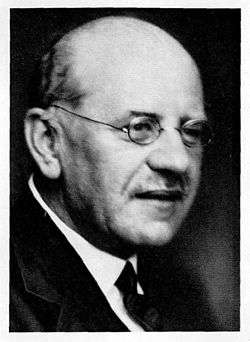Alfred Heuß
Alfred Valentin Heuß also Heuss (27 January 1877 – 9 July 1934) was a German musicologist, music critic and editor of music magazines.

Life
Born in Chur, after studying music in Stuttgart, Munich and Leipzig, Heuß received his doctorate in 1902 and was editor of the Zeitschrift der internationalen Musikgesellschaft from 1904 to 1914, and editor-in-chief of the Neue Zeitschrift für Musik from 1921 to 1929. As a music critic and music writer, Heuß published mainly on early music and on the music of the classical and romantic periods.
Heuß was hostile to contemporary music, which he regarded as "un-German". Oliver Hilmes has described how Heuß developed the Zeitschrift für Musik during the Weimar Republic into a bulwark against the avant-garde and everything supposedly 'un-German'. The tendency of the Monatsblatt, which can be seen especially in the reviews of contemporary works, was not based on differentiated analysis, but rather brought sweeping devaluations and stereotypical prejudices into play. So-called 'killer-phrases' pretended to reveal the causes of complex social crises. In reality, however, the pseudo-arguments contributed to a dogmatic division into 'good' and 'evil'. Heuß stood up as judge about the right to exist of works and their creators.[1] His criticism also referred to conductors like Gustav Brecher. The music ideology in the Nazi State was only the culmination of a development that had begun long before.
Heuß' tight national attitude was accompanied by hatred of modernity and pronounced anti-Semitism. An article in 1925 criticized Arnold Schönberg's appointment as head of one of the three master classes for composition at the Prussian Academy of Arts in Berlin. At the outset, he made his aesthetic judgment of Schönberg's compositions: "Every connoisseur of the circumstances, whether standing on the right or the left, knows that the time of Schönberg's hysterical convulsions and feverish shivers in music is over, that he is heading for and must head for completely different goals, because the embodied unnaturalness cannot be taken as a principle in length."[2] In the next step, Schönberg's vocation turned into a national tragedy: "The test of its existence, which has already been so far assured, will cost German music at least several decades, and its source will continue to flow murky for a long time to come, because specifically Jewish forces, for the first time in its history, have taken its development into their own hands in a time of inner weakening. The Jew as a fanatical leader, who is nowhere more down-to-earth and who consciously wants to be without tradition - that means nothing else than the path to ruin.[3]
Heuß was also active as a composer himself. His sons were the historian Alfred Heuß and the national economist Ernst Heuss.
Heuß died in Gaschwitz near Leipzig at age 77.
Further reading
- Alfred Burgartz: Alfred Heuß †. In Die Musik. 26th year, second half of 1934, pp. 845–846 (Alfred Heuß is available for free download at the Internet Archive).
- Gustav Bosse: Dr. Alfred Heuß †. In Neue Zeitschrift für Musik. 101st year, second half of 1934, pp. 813–814. (Alfred Heuß is available for free download at the Internet Archive).
- Fritz Stege: Ein Abschiedswort dem unvergesslichen Freunde Dr. Alfred Heuß. In Neue Zeitschrift für Musik. 101st year, second half of 1934, p. 815 (Alfred Heuß is available for free download at the Internet Archive).
- Hans Schnoor: Alfred Heuß †. In Neue Zeitschrift für Musik. 101. Jg., 2. Halbjahr 1934, pp. 865–86. (Alfred Heuß is available for free download at the Internet Archive).
- Oliver Hilmes: Der Streit ums „Deutsche“. Alfred Heuß und die Zeitschrift für Musik (Musikstadt Leipzig. Volume 5).[4] von Bockel, Hamburg 2000, ISBN 3-932696-43-3.
- Rudolf Stephan (1972), "Heuß, Alfred", Neue Deutsche Biographie (NDB) (in German), 9, Berlin: Duncker & Humblot, pp. 57–57; (full text online)
External links
- Literature by and about Alfred Heuß in the German National Library catalogue
References
- Cf. Oliver Hilmes, Der Streit ums "Deutsche", p. 7.
- Alfred Heuß: Arnold Schönberg - Prussian teacher of composition. In Neue Zeitschrift für Musik. 92nd year, issue 10, October 1925, pp. 583–585, here p. 583 (Alfred Heuß is available for free download at the Internet Archive).
- Heuß, Arnold Schönberg – Preußischer Kompositionslehrer. p. 584.
- Der Streit ums "Deutsche" : Alfred Heuss und die Zeitschrift für Musik on WorldCat